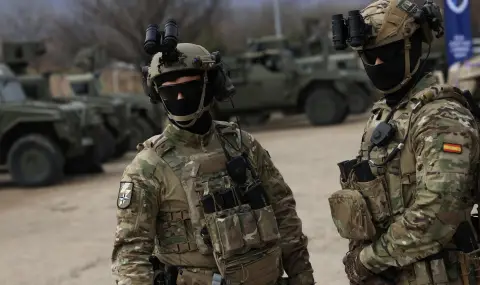Since November 2022, Spain has trained 7,000 Ukrainian soldiers. In addition, over the past three years, the country has donated a significant amount of military equipment to Kiev, including "Leopard" tanks. And at the end of February 2025, Spanish Prime Minister Pedro Sanchez promised that this assistance would continue in the future - Madrid will donate military equipment worth one billion euros to Ukraine annually, according to the Euractiv website.
It seems that Spain is strongly committed to supporting Ukraine. But also to the defense of Europe: at the "Los Llanos" air base Several times a year, NATO air squadrons gather in Albacete under the Tactical Leadership Program (TLP), in which fighter pilots are trained to act together in an emergency, writes the German public media ARD.
Spain is at the bottom of the defense spending
At the same time, however, with just under 1.3% of its gross domestic product (GDP) allocated to defense, Spain is at the bottom of the NATO ranking. Only Iceland spends less for this purpose, but the northern country has no army at all. Why?
In fact, this is nothing new: even before the left-wing minority government of Pedro Sánchez came to power, Spain invested too little in its defense, ARD points out and in this regard quotes Spanish political scientist Fernando Weispin, according to whom this is a tradition in this country – whether it is run by a left-wing or right-wing government.
However, Prime Minister Pedro Sánchez is now under double pressure: his coalition partner, the "Sumar" alliance, is against increasing military spending - especially if it comes at the expense of social spending.
But NATO is counting on Spain. Secretary General Mark Rutte recently announced that Spain, along with other countries, wants to reach the two percent target by the summer. Last week, US Assistant Secretary of State Christopher Landau also called on Spain to increase its defense spending in line with its NATO commitments.
Prime Minister and master of political survival, Pedro Sánchez, is currently trying to appease both sides - his coalition partners and NATO allies. In the Spanish parliament, he announced an increase in investments in security and defense, without giving specific figures, ARD further states.
Sánchez is governing with a minority government with several smaller parties. If the largest partner "Sumar" does not support him, it will be very difficult for him to push through any decision, including the country's budget. The conservative opposition Popular Party (PP) would spend more on defense itself, but it and Sanchez's Spanish Socialist Workers' Party (PSOE) have traditionally been at odds and are reluctant to form a coalition.
Nevertheless, political scientist Weisspin believes it is essential that they reach an agreement on defense spending: "I am convinced that both the PSOE and the PP, which represent a majority of almost 70% of Spanish voters, feel committed to European guidelines."
Franco's shadow remains
In fact, the Spanish economy is booming - growth is expected to exceed three percent in 2024. But despite the good economic data, the issue of security is not a top priority for Spanish citizens. The war in Ukraine is far away, and the Spaniards have other concerns - such as the extreme housing shortage, which is a much more pressing issue in their minds. The latest Eurobarometer revealed that the Spaniards are almost the least concerned about security and defense in the EU, we read further in the ARD publication.
Furthermore, after the civil war and the military dictatorship, they have a rather contradictory attitude towards the military. According to Fernando Weispin, there is an established pacifist movement in Spain. Spain did not participate in either the First or the Second World War. And further: "Until the beginning of democracy in our country, there was always the idea that our army was closely linked to the Franco regime". Despite this, the army and the police today have a good reputation.
But spending more than before? It is still unclear with whose votes Spain could achieve the much-discussed two percent defense target, the ARD publication also says.
Author: Christina Böcker (ARD)
